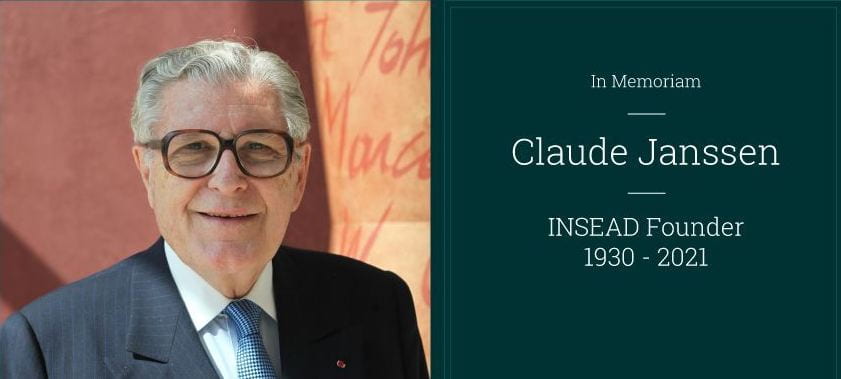INSEAD mourns the loss of founder and lifelong leader
No one has supported the INSEAD family and promoted its values-driven purpose with more flexibility, fidelity and efficacy than Claude Janssen. The most faithful of stewards and the very definition of effectiveness paired with discretion, Claude was always willing and amply able to take centre stage. But he was happiest when working behind the scenes to build momentum and consensus to propel our school to ever-greater heights of impact and excellence.
Claude’s commitment to INSEAD and its principles can be traced back to his early life. As a young scholar, he was never anything but exceptional, both in achievement and in imagination, as evidenced by his unique ability to think, then envision, then act, beyond the conventional. On graduating from the prestigious École Polytechnique in Paris, perhaps the grandest of France’s grandes écoles, Claude did not follow the prescribed path and immediately enter French industry. Instead, he chose to pursue an MBA at Harvard University.
Today, such a choice seems obvious, its value self-evident. But our current belief in the power of international business education owes much to the work of Claude and his co-founders. At the time it was nothing short of radical for a European to enrol on an MBA in the US.
While at Harvard, Claude encountered the legendary Georges Doriot, the first French graduate of the Harvard Business School and its first French professor. An inspiring teacher, he had long dreamed of bringing a graduate business programme to Europe. But his vision went far beyond the American model.
Having experienced the wholesale destruction of Europe by World War II in Europe and now confronted with the apocalyptic threats of the Cold War, General Doriot envisioned a revolutionary business school defined by internationalism, diversity, independence, entrepreneurism, and proximity to business. He believed that the interaction of this unique combination of core principles could help to transform a newly integrated Europe, stimulating economic growth and fostering peace and prosperity. It was a vision that was practical yet idealistic and, though daring, reflected the zeitgeist.
Claude did not simply believe in the idea that would become INSEAD; he gave his time, his energies, and his passions to manifest it. This generosity was always without financial recompense, free of any aspect of self-advancement, and often at great personal sacrifice.
In 1955, Claude returned to France and went to work for the Worms group, a prominent private Paris-based group active in banking, insurance, shipping, and industry. Here he would spend his entire career, becoming one of four managing partners before his retirement in 1996. Like all young executives in their first position, Claude faced long hours, a steep learning curve, and exhaustive demands.
Yet just when the requirements on his time were greatest, Claude – along with compatriots Olivier Giscard d’Estaing and Jean Raindre, both fellow Harvard graduates and Doriot disciples – threw himself into the INSEAD project. He was instrumental in finding and vetting candidates to become INSEAD’s first Director General, as well as scouring the Paris region for a potential home for the new school and serving on the Comité Technique, charged with constituting INSEAD’s operating policies and course outlines.
All of this effort was for the sake of a mere idea: a collective aspiration without precedent, a school offering a programme without accreditation, without proven demand, without financial backing, without faculty, even without permanent facilities. As with any entrepreneurial start-up, the likelihood of failure was high, and the chance for success slim. The scales were further weighted by the short-sightedness of some members of the French establishment, who contended that INSEAD’s multinational orientation would encourage a diaspora of domestic talent rather than concentrating it at home.
Nevertheless, the founders and early supporters – from General Doriot, to the French Chamber of Commerce, to far-thinking French and European industrial behemoths and captains of industry, to d’Estaing, Raindre and Janssen – held firm. They were confident that their convictions would attract likeminded pioneers. And on 12 September 1959, Janssen, Raindre and Doriot were finally able to cable the General: “The ship is launched. 57 registered today. Opening ceremonies completed. All engines turning.”
Two days later, Claude closed a longer communication to Doriot with, “It remains for us to thank you for starting up the whole idea and giving us the opportunity to contribute to an endeavour with so much future.”

